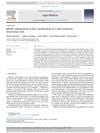Search
for
Sort by
Research
360-390 / 1000+ results
research Changes in Hair Weight and Hair Count in Men with Androgenetic Alopecia After Application of 5% and 2% Topical Minoxidil, Placebo, or No Treatment
Minoxidil increases hair weight and count temporarily in men with hair loss.

research First Use of Thymus Transplantation Therapy for FOXN1 Deficiency (Nude/SCID): A Report of 2 Cases
Thymus transplantation successfully restored immune function in infants with FOXN1 deficiency.

research Systemic Steroids With or Without 2% Topical Minoxidil in the Treatment of Alopecia Areata
Steroids help hair regrowth, and minoxidil slows post-steroid hair loss, but effects are temporary.

research Male Gonadal Function in Coeliac Disease: Sex Hormones
Men with coeliac disease may have hormone imbalances that could affect sexual function, but these can improve with better gut health.

research Modulation of Glucocorticoid Action and the Treatment of Type-2 Diabetes
Targeting glucocorticoid action might help treat type-2 diabetes, but human trials are needed.

research A Powerful Method for Pleiotropic Analysis Under Composite Null Hypothesis Identifies Novel Shared Loci Between Type 2 Diabetes and Prostate Cancer
New method finds genetic links between Type 2 Diabetes and Prostate Cancer not seen before.

research Janus Kinase Inhibition in Down Syndrome: Two Cases of Therapeutic Benefit for Alopecia Areata
JAK inhibitors helped treat hair loss in two people with Down syndrome.
research Anti-Acne Drugs in Phase 1 and 2 Clinical Trials
New anti-acne medications are being tested to offer alternatives to current treatments.

research Continued Improvement in Pressure-Flow Parameters in Men Receiving Finasteride for 2 Years
Finasteride improves urinary function in men for 2 years.

research Contact Dermatitis in Reaction to 2% Topical Minoxidil Solution
Minoxidil solution can cause skin irritation and allergies in some users.

research Factors Associated with Anti-SARS-CoV-2 IgG Antibody Production in Patients Convalescing from COVID-19
Men, diabetes, and high inflammation levels lead to higher COVID-19 antibodies.

research Analysis of Genetic Polymorphisms of Steroid 5α-Reductase Type 1 and 2 Genes in Korean Men with Androgenetic Alopecia
Gene differences may affect baldness treatment response in Korean men.

research Sex Hormones in SARS-CoV-2 Susceptibility: Key Players or Confounders?
Sex hormones' effects on COVID-19 are unclear and more research is needed to understand their potential as treatment.

research Biallelic Variants in Lanosterol Synthase (LSS) Cause Palmoplantar Keratoderma-Congenital Alopecia Syndrome Type 2
Certain genetic changes in the LSS gene cause a rare skin and hair condition.

research Synthesis and Biological Evaluation of 4-(4-(Alkyl- and Phenylaminocarbonyl)benzoyl)benzoic Acid Derivatives as Non-Steroidal Inhibitors of Steroid 5α-Reductase Isozymes 1 and 2
The compound 4c effectively inhibits the enzyme linked to hair loss.
research An Assessment of Cyproterone Acetate and Ethinyl Estradiol and Lynoestrenol (Minilyn) in the Treatment of Idiopathic Hirsutism
Cyproterone acetate can effectively treat idiopathic hirsutism, but ethinyl oestradiol and lynoestrenol may not always reduce hair growth.

research Specific Interpretation of Hair Concentrations in Two Fatal Metformin Intoxication Cases
Hair analysis showed very high metformin levels in two fatal overdose cases, suggesting it's useful in forensics but sweat may affect results.

research Cashmere Growth Control in Liaoning Cashmere Goat by Ovarian Carcinoma Immunoreactive Antigen-Like Protein 2 and Decorin Genes
OCIAD2 and DCN genes affect hair growth in goats by having opposite effects on a growth signaling pathway and inhibiting each other.

research Placebo-Controlled Dose-Effect Studies with Topical Minoxidil 2% or 5% in Male-Patterned Hair Loss Treated with Oral Finasteride Employing an Analytical and Exhaustive Study Protocol
Minoxidil 5% works better than 2% for hair growth in male-patterned hair loss.

research The Osler Lecture 2012: Pharmacology 2.0, Medicines, Drugs, and Human Enhancement
The lecture concluded that drugs for human enhancement are here to stay and called for their responsible development and fair access.

research Telogen Effluvium in SARS-CoV-2 Infection: Histological Aspects
COVID-19 can cause a temporary hair loss condition.

research An Atypical Clinical Presentation of Alopecia in Two Patients with Systemic Lupus Erythematosus
Two patients with lupus had an unusual type of hair loss not typical for the disease but improved with treatment.
research Hutchinson-Gilford Progeria Syndrome: Report of 2 Cases and a Novel LMNA Mutation in China
A new genetic mutation linked to Hutchinson-Gilford progeria syndrome was found in China.
research Identification of Key Genes in Type 2 Diabetes-Induced Erectile Dysfunction Rats with Stem Cell Therapy Through High-Throughput Sequencing and Bioinformatic Analysis
Stem cell therapy affects 15 key genes in rats with diabetes-related erectile dysfunction.

research Genetic and Hormonal Influence on SARS-CoV-2 Infection Susceptibility
Men may be more vulnerable to severe COVID-19 due to genetic and hormonal factors, but more research is needed.

research Trichogenic Effect of Topical Ketoconazole Versus Minoxidil 2% in Female Pattern Hair Loss: A Clinical and Trichoscopic Evaluation
Minoxidil works faster, but ketoconazole is a safer alternative for female hair loss.

research Identifying Long-Term Effects of SARS-CoV-2 and Their Association With Social Determinants of Health in a Cohort of Over One Million COVID-19 Survivors
Long-term effects of COVID-19 can vary over time and are more likely in certain age and gender groups, while race, income, and education levels have little to no impact. Ongoing medical care is needed due to potential complications.

research Effect of Prostaglandin D2 on Hair Follicle Growth and Its Impact on Hair Follicle Stem/Progenitor Cells
Blocking Prostaglandin D₂ may help treat hair loss.

research Multiple Endocrine Defects in Adult-Onset Sprouty1/2/4 Triple Knockout Mice
Removing Sprouty genes in mice causes various hormone-related issues but does not increase cancer risk by one year of age.